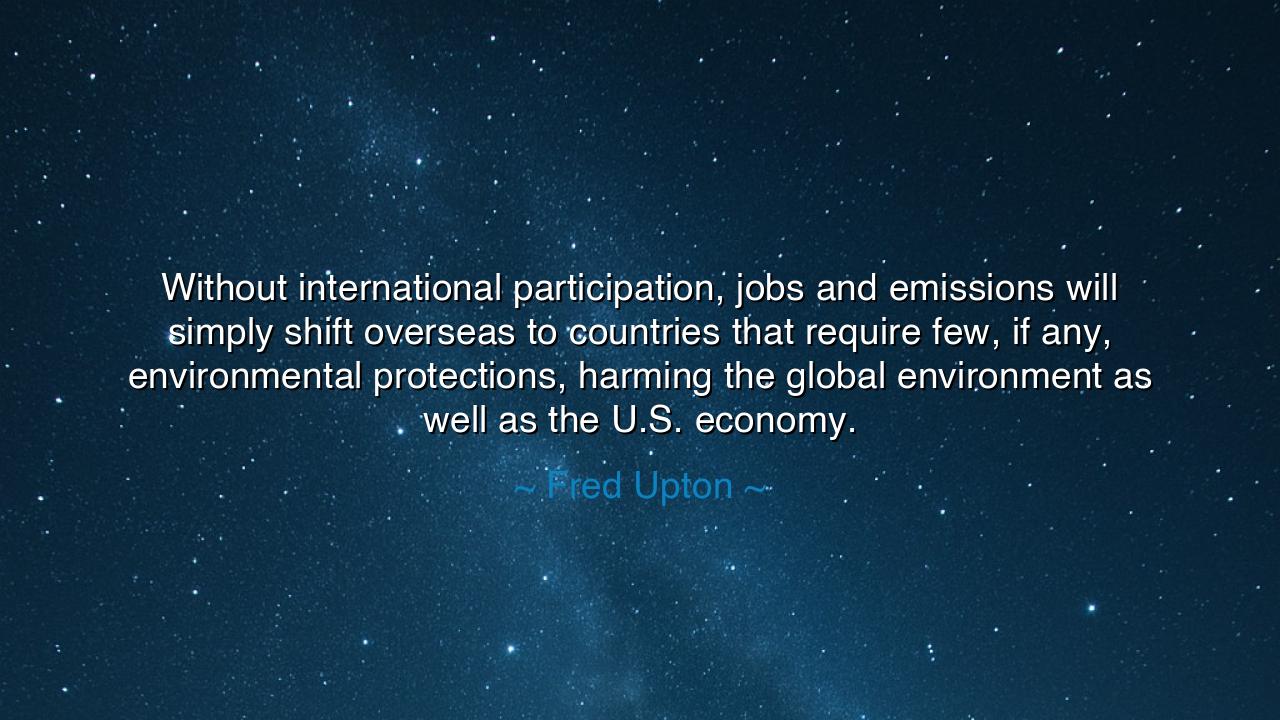
Without international participation, jobs and emissions will
Without international participation, jobs and emissions will simply shift overseas to countries that require few, if any, environmental protections, harming the global environment as well as the U.S. economy.






The words of Fred Upton, “Without international participation, jobs and emissions will simply shift overseas to countries that require few, if any, environmental protections, harming the global environment as well as the U.S. economy,” carry the stern weight of wisdom forged in the furnace of modern trade and politics. They reveal the truth that no nation, however mighty, can fight the battle for the earth alone. For in an age when markets are global and industries span oceans, to guard the environment in one land while allowing destruction in another is but to rearrange the smoke, not to clear the air. His words are a call to unity, to shared duty, and to the recognition that the earth itself knows no borders.
The origin of this saying lies in the fierce debates of the late twentieth and early twenty-first centuries, when nations grappled with climate change, globalization, and the shifting of industry. Upton, a lawmaker, saw that when environmental standards grew stricter in one country, industries often fled to another where protections were weaker. The pollution did not vanish; it was merely exported. Jobs too were carried away, leaving behind hollowed-out communities at home and poisoned rivers abroad. Thus, Upton warned that without international participation, both economy and environment would suffer, and the cycle of exploitation would continue unchecked.
History offers a mirror in the tale of the Industrial Revolution in England. When factories belched smoke into the skies and poured waste into rivers, reformers eventually forced stricter regulations. Yet many companies, seeking profit above all else, shifted their operations to colonies and distant lands where laws were weaker and people had less power to resist. The suffering of the earth did not cease—it was only displaced. The story repeats in our own age, where corporations shift production to nations with few protections, reaping wealth while leaving both foreign workers and the global climate to pay the price.
The deeper meaning of Upton’s words is that justice must be global or it will not be justice at all. For what is the worth of clean skies in one nation if the same industries choke the skies of another? What is the worth of prosperity at home if it is built upon the exploitation of distant laborers? The planet is one body, and to poison one limb is to sicken the whole. To ignore this truth is to invite collapse not only of nature but of trust between nations. Only through shared resolve, through international agreements and cooperation, can humanity hope to bind greed and protect the fragile balance of the earth.
Yet his saying also strikes at the heart of economic wisdom. Jobs are not mere numbers, but lifelines for families and communities. When companies flee to places without protections, they rob their own people of livelihoods while exploiting the poor abroad. The promise of cheaper goods comes at the hidden price of unemployment at home and suffering elsewhere. Upton reminds us that the economy and the environment are not enemies but allies: to protect one, we must protect the other. Only when labor is fairly rewarded and the earth is respected can prosperity endure.
The lesson for us is clear: demand cooperation that reaches beyond borders. Support leaders and policies that bind nations together in environmental responsibility, rather than pitting them against one another in a race to the bottom. Choose goods that are ethically and sustainably made, for each purchase is a vote in the great council of commerce. Recognize that what harms a worker in a distant land or poisons a river across the sea will one day return to touch us as well. The smoke that rises in one land drifts upon the winds of the whole world.
Therefore, let us live as citizens not only of nations but of the earth itself. Let us see that international participation is not a matter of politics alone, but of survival, of dignity, and of honor. Stand for trade that uplifts all people, not only the wealthy. Speak for laws that protect the planet as one shared home. And in your daily life, remember that every choice connects you to the greater whole.
So let Upton’s words endure as a guiding flame: “Without international participation… the global environment and economy alike are harmed.” This is both warning and hope. For if the nations stand divided, the earth will groan beneath the weight of our folly. But if the nations rise together, united in purpose, then we may yet hand to our children a world not diminished, but renewed—prosperous, fair, and flourishing for all.






AAdministratorAdministrator
Welcome, honored guests. Please leave a comment, we will respond soon